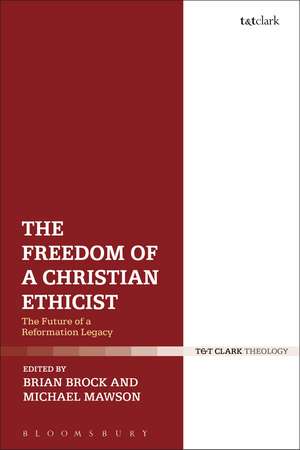The Freedom of a Christian Ethicist: The Future of a Reformation Legacy
Editat de Dr Brian Brock, Dr Michael Mawsonen Limba Engleză Paperback – 25 iul 2018
| Toate formatele și edițiile | Preț | Express |
|---|---|---|
| Paperback (1) | 236.74 lei 6-8 săpt. | |
| Bloomsbury Publishing – 25 iul 2018 | 236.74 lei 6-8 săpt. | |
| Hardback (1) | 773.23 lei 6-8 săpt. | |
| Bloomsbury Publishing – 13 ian 2016 | 773.23 lei 6-8 săpt. |
Preț: 236.74 lei
Preț vechi: 305.22 lei
-22% Nou
Puncte Express: 355
Preț estimativ în valută:
45.30€ • 48.44$ • 37.77£
45.30€ • 48.44$ • 37.77£
Carte tipărită la comandă
Livrare economică 17 aprilie-01 mai
Preluare comenzi: 021 569.72.76
Specificații
ISBN-13: 9780567683649
ISBN-10: 0567683648
Pagini: 224
Dimensiuni: 156 x 234 x 16 mm
Greutate: 0.31 kg
Ediția:NIPPOD
Editura: Bloomsbury Publishing
Colecția T&T Clark
Locul publicării:London, United Kingdom
ISBN-10: 0567683648
Pagini: 224
Dimensiuni: 156 x 234 x 16 mm
Greutate: 0.31 kg
Ediția:NIPPOD
Editura: Bloomsbury Publishing
Colecția T&T Clark
Locul publicării:London, United Kingdom
Caracteristici
Focuses on the significance of the Reformation and its legacy in English-speaking theology in recent decades
Notă biografică
Brian Brock is Reader in Moral and Practical Theology at the University of Aberdeen, UK.Michael Mawson is Lecturer in Theological Ethics, University of Aberdeen, UK.
Cuprins
AcknowledgementsList of Abbreviations ContributorsIntroductionMichael Mawson 1. Citizens of HeavenStanley Hauerwas, Duke Divinity School, USA2. The Plight of Protestant EthicsGerald McKenny, University of Notre Dame, USA3. The Messianic Contours of Evangelical Ethics Hans G. Ulrich, Friedrich-Alexander University, Germany4. Living in the Wake of God's Acts: Luther's Mary as Key to Barth's Command Brian Brock, University of Aberdeen, UK5. How to Do or Not Do Protestant Ethics Stanley Hauerwas, Duke Divinity School, USA6. Anabaptist Ethics After Yoder: Accepting the Limits on the Freedom of a Christian EthicistPaul Martens, Baylor University, USA7. The Politics of Jesus and the Ethics of Christ: Why the Differences between Yoder and Bonhoeffer Matter Michael Mawson, University of Aberdeen, UK 8. 'We, as to our own Particulars.' Conscience and Vocation in Quaker Tradition Rachel Muers, University of Leeds, UK9. Sleepers Wake! Eudaimonism, Obligation, and the Call to Responsibility Jennifer A. Herdt, Yale Divinity School, USA10. On What we Lost when (or if) we Lost the Saints. Michael Banner, University of Cambridge, UKBibliography Index
Recenzii
This is a very well-presented volume of ten fiercely intelligent engagements on the current state of the discipline ... To those in the guild it will be essential reading. To those beyond it, it provides a window into the state of the art.
The Freedom of a Christian Ethicist is a book not to be missed. Unusually rewarding in theological insight, spiritual nourishment and ethical challenge, this collection engages a tradition that is very much alive.
This volume should be commended for its rich and varied contribution to contemporary Protestant ethics.
An eclectic and unfailingly provocative collection of real contemporary relevance ... I can imagine a well-merited place for these essays in an advanced seminary or university class on moral theology.
Very thought provoking both in wrestling with the Yoder issue and thinking through what freedom and obedience look like in this fearful new world.
This distinguished collection of studies of the legacy and prospects of Protestant moral theology brings together some of the most lively thinkers in the field. In scope, argumentative power and theological dedication, the explorations of the enduring value of the various Reformation ethical traditions could hardly be bettered.
Recent Protestant ethics is notable for its ecumenism. This provocative volume - without anxiety, caricature, or triumphalism - adopts a fresh approach by rethinking the distinctive legacies of various Reformation sources themselves. At a time when this inheritance can be met with indifference or suspicion, The Freedom of a Christian Ethicist assembles a stellar group of essays that speak to urgent questions of theory and practice. This diverse assessment by leading scholars will be of interest to many beyond the "guild" of Christian ethics. But it is a must read for those within it.
The Freedom of a Christian Ethicist is a book not to be missed. Unusually rewarding in theological insight, spiritual nourishment and ethical challenge, this collection engages a tradition that is very much alive.
This volume should be commended for its rich and varied contribution to contemporary Protestant ethics.
An eclectic and unfailingly provocative collection of real contemporary relevance ... I can imagine a well-merited place for these essays in an advanced seminary or university class on moral theology.
Very thought provoking both in wrestling with the Yoder issue and thinking through what freedom and obedience look like in this fearful new world.
This distinguished collection of studies of the legacy and prospects of Protestant moral theology brings together some of the most lively thinkers in the field. In scope, argumentative power and theological dedication, the explorations of the enduring value of the various Reformation ethical traditions could hardly be bettered.
Recent Protestant ethics is notable for its ecumenism. This provocative volume - without anxiety, caricature, or triumphalism - adopts a fresh approach by rethinking the distinctive legacies of various Reformation sources themselves. At a time when this inheritance can be met with indifference or suspicion, The Freedom of a Christian Ethicist assembles a stellar group of essays that speak to urgent questions of theory and practice. This diverse assessment by leading scholars will be of interest to many beyond the "guild" of Christian ethics. But it is a must read for those within it.
